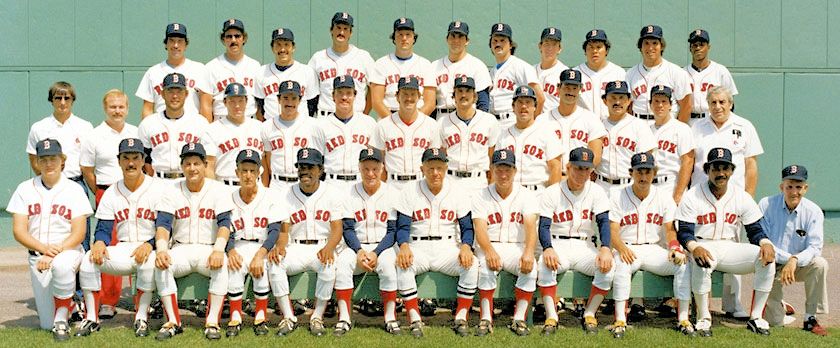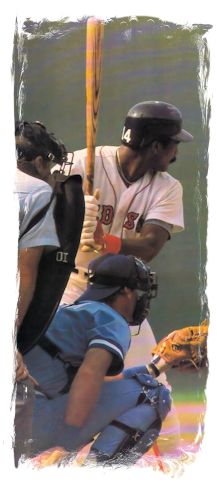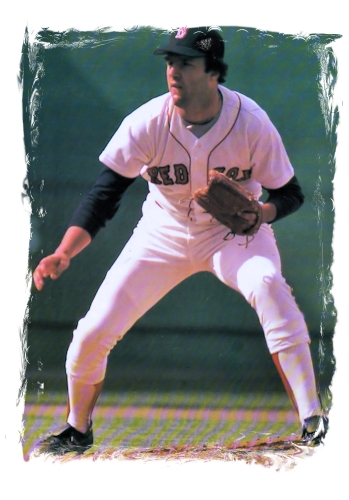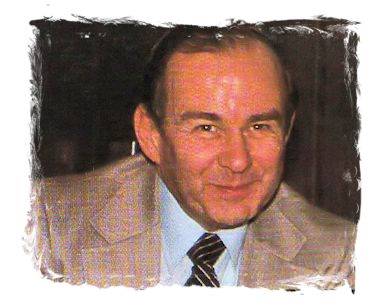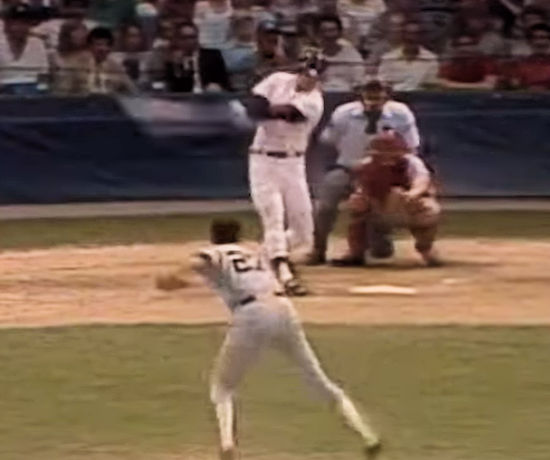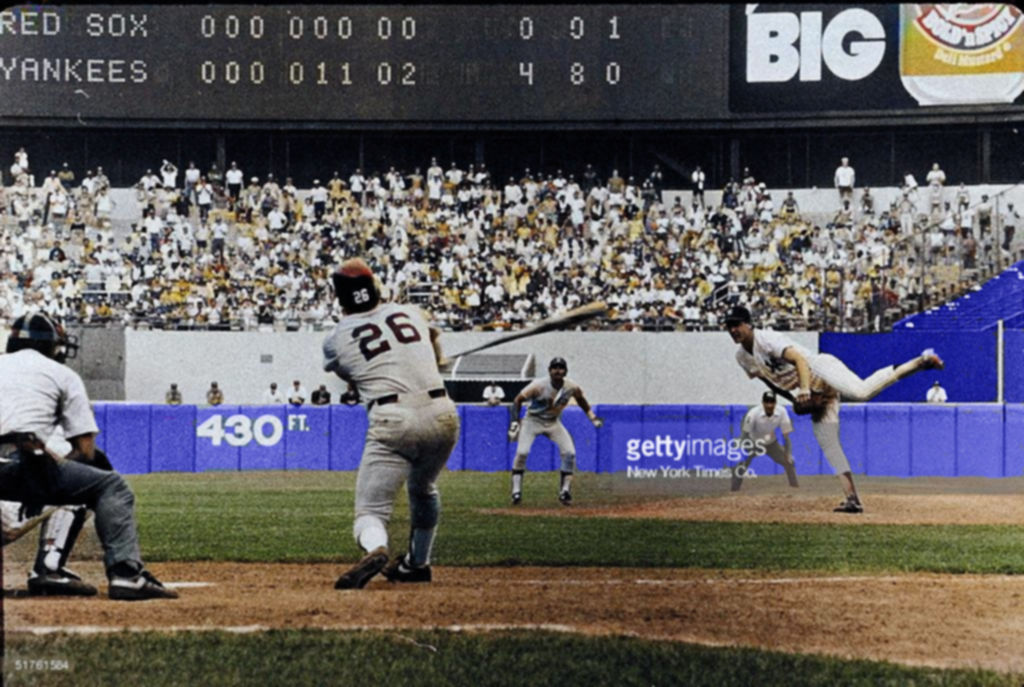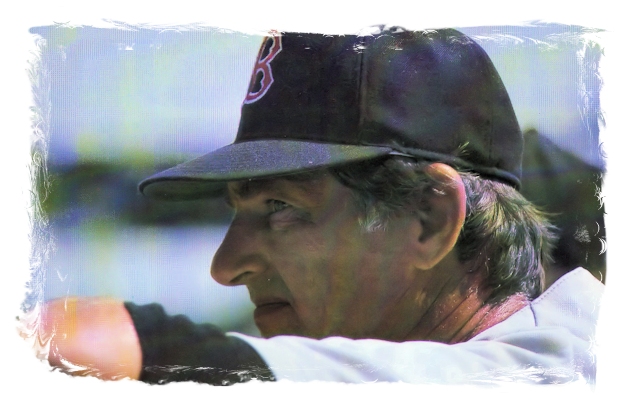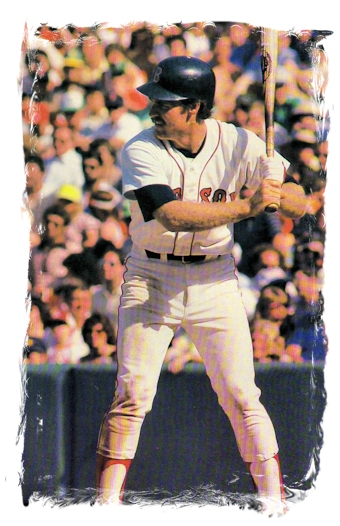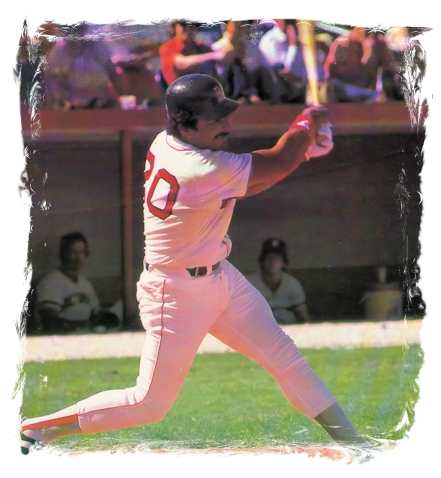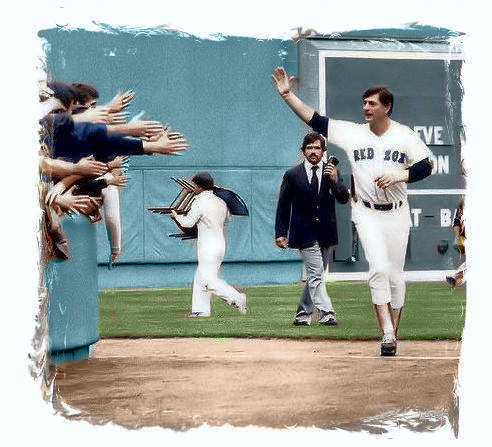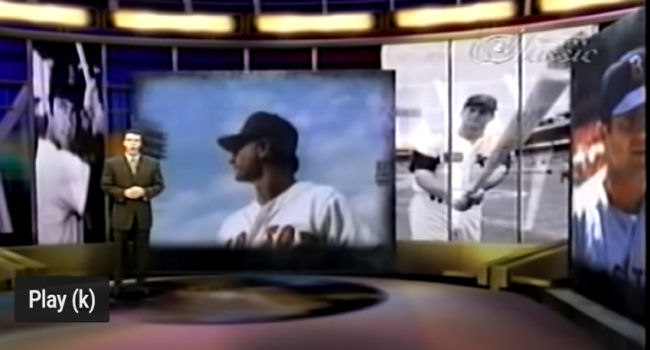|
1983 BOSTON RED SOX ...
The Red Sox needed pitching and had their sights set on getting Dave Righetti, Britt Burns or Tim Lollar for Carney Lansford, who would be a free agent at the end of the upcoming season. Lansford wanted a $6M deal over five years and the Sox were offering $3.5M. Instead, on December 6th, Tony Armas and catcher Jeff Newman were traded from the Oakland Athletics for Lansford, outfielder Garry Hancock and minor leaguer, Jerry King. Armas had three more years on a $650K contract with a two-year club option. Pitcher Doug Bird came to the Sox from the Chicago Cubs on December 10th for Mike Torrez and Chuck Rainey. In February, the Sox signed pitcher Mark Fidrych as a free agent. On March 10th, the Red Sox agreed to a new contract with Wade Boggs, for $100K plus $15K in incentives. The Sox put Jerry Remy on the DL with back issues, opening a spot for secondbaseman, Marty Barrett on the opening day roster. Mark Fidrych, along with Dennis "Oil Can" Boyd were sent down to Pawtucket on March 26th, when the Sox had to cut down their roster to 32 players. Not able to gain any consistency and control, Fidrych finally retired from baseball on June 29th, at the age of 28, with a sore shoulder, later diagnosed as a torn rotator cuff. Bruce Hurst had the bone chips in his elbow removed over the winter and came into camp feeling great. He posted a 1.29 ERA in spring training games. A young kid named Roger Clemens of Texas, stayed in Winter Haven, to get some experience pitching in "A" ball.
Young Jonathan Keane, the boy Jim Rice had saved after being hit by a foul ball, the year before, returned for Opening Day in 1983 to throw the ceremonial first pitch on April 5th. Unfortunately, Dennis Eckersley was the loser, 7-1, to the Toronto Blue Jays. The loss was not an easy one, either. The balls that were hit off Eckersley were hit a long way. He lasted for only four complete innings and two batters in the fifth and surrendered all seven runs. He was relieved by Bruce Hurst, who tossed four innings of two-hit shutout relief in his first effort of the year. In the next game on April 7th, John Tudor was the starter, and after four innings, he had a 7-3 lead. But that didn't stop Ralph Houk from lifting him in favor of Bob Stanley who picked up his first victory of the year with a five-inning stint. In Texas, on April 8th, the power-hitting middle of the Red Sox lineup struggled to make contact, but Dave Stapleton collected four hits and scored three times for his part of a 15-hit Red Sox attack. Wade Boggs drove in five runs with three hits, including two doubles. But two days later, on April 10th, the Red Sox handed Dennis Eckersley, a 7-0 lead by the top of the third inning. But Eck accepted the seven-run lead and promptly gave five back in the bottom of the third. In Kansas City, after losing the first two games, the Sox battered the Royals' pitching for 21 hits and three four-run innings in an 18-4 bombing, on April 13th, that not only broke their previous record high of 11 runs on the Royals' turf but were the biggest hit and run totals since 1979. Glenn Hoffman had his first five-hit game in the majors, including a double, to raise his average to .400. Jim Rice had a triple, a tremendous two-run homer, three RBIs, and three runs scored. Dwight Evans (.365) had a double, two singles, and scored three runs. Wade Boggs, who has reached base 20 of the 40 times he had come to the plate in the leadoff spot, was hitting .412 and leading the club in RBIs with eight, had two hits, including a hustle double, a walk and a stolen base. And Rick Miller completed the 10-hit, 10-run, 10-RBI production from the first four hitters by knocking in three more runs with two singles. Dennis Eckersley bounced back with a 4-1 win against the Rangers at Fenway, on April 15th. On April 16th, Bruce Hurst worked a career high of 7 2/3 innings, striking out his major league high (8), and generally turned in his best outing since coming to the majors, winning 2-1.
After taking 2 of 3 from the Rangers, the World Champion Brewers came into Fenway and bombed the Sox 14-0 on April 18th. But on April 20th, the Sox came back dramatically. Down by two runs in the bottom of the ninth, Jim Rice blasted a two-run homer to tie up the game. A base hit by Yaz, a double by Dave Stapleton, and an intentional pass loaded the bases. Brewers' reliever, Pete Ladd, came in and then walked Tony Armas to give the Sox a 5-4 win. It was Jim Rice again in Oakland on April 22nd. What had gone to the ninth inning a brilliant pitching duel between Bruce Hurst and Oakland rookie Bill Krueger, was broken up by Rice's titanic two-run homer. Bob Stanley then got the final three outs to finish off the finest and longest performance of Hurst's career to give the Red Sox a 3-1 victory, in the opener of an eight game West Coast swing. John Tudor battled his way thru jams on April 24th in Oakland. Behind two homers by Dwight Evans, the Sox knocked off the A's, 4 to 2. In Seattle on April 27th, Dennis Eckersley pulled out a 2-1 victory over the Mariners when Wade Boggs scored the winning run from second on an infield grounder and Reid Nichols threw out the tying run at the plate with two outs in the ninth. Down the coast to Anaheim and Tony Armas came up in the top of the ninth, to hit a two-out, two-run double off the top of the center-field wall and bring the Red Sox their most dramatic victory of the season, 6-5 on April 29th. Thanks to a three-run homer by Fred Lynn, the Angels had taken a 5-3 lead into the ninth. But two walks, a Wade Boggs single, and a ground ball had gotten it to 5-4 when Armas struck his first dramatic shot in a Red Sox uniform off Luis Sanchez.
The Red Sox went 5-2 on the West Coast trip. In the final game in Anaheim, on May 1st, they rallied from 6-0 and 9-4 deficits, until Jerry Remy could tie the game in the seventh with one single and win it with two out in the ninth with another single to pull off a 10-9 victory over the Angels. On the trip, three of the games they won in the ninth. Bob Stanley completed a trip he should long remember. He saved the first four wins and won the last one. They came home, 11-9 and 1/2 game out of first. Dwight Evans started the Fenway homestand in May with a bang. Against the A's on May 3rd, he beat out an infield single in his first at-bat, and in the third, with two men on base, Evans crashed his fourth home run of the year and his 22nd career blast against Oakland, with the Sox winning 3-1. The next night on May 4th, the Sox captured first place with a 7-1 victory behind Bruce Hurst. Hurst had been working on a more compact, slower delivery and it paid off. He began the night by striking out the side, and helped by a quick six-run lead, pitched his first career complete game and the Red Sox' first since last October 2nd. With his five-hit, six-strikeout, victory over Oakland, Hurst equaled his career-season high for wins with his third in four decisions that included a 2.79 ERA. On May 6th, Jim Rice drove in five runs in a 6-4 victory over the Seattle Mariners. Rice had three hits, including two doubles, and almost single-handedly destroyed the Mariners in helping the Red Sox post their fourth straight victory. The next night, on May 7th, Mike Brown went out, ran and sank his fastball in and out, used his slider as his deterrent weapon and pitched to the park and the winds. The result was his first shutout, without a runner past second base. The Sox walked off with an 8-0 victory over the Mariners and held on to first place by 1/2 game over Baltimore.
Against the Angels, Bob Stanley came to work in the third inning of the May 9th contest and proceeded to put on the kind of relief performance that made him so tough this year. Ralph Houk called on Stanley with one out in the top of the third inning and the Red Sox leading, 4-2. The bases were loaded and Stanley got out of that inning with a double play, then shut out the Angels the rest of the way, allowing only two base hits in an 8-2 victory. His 6 2/3 inning performance gave him his third victory against two losses and an American League-leading earned-run average of 1.05. In Milwaukee, the now second place, Red Sox took 2 of 3 from the Champs. On May 12th, Mike Brown and Bob Stanley teamed up to beat the Brewers, 5 to 3. The Sox pitching staff had a 2.87 ERA in the last 15 games. In the final game of the series on May 15th, Bobby Ojeda went out and beat the Brewers, 6-1. He allowed only four singles in his 6 1/3 inning stint. But, most impressive, with the score 5- 0 in the sixth, he had the bases loaded with none out and got out of it with only one run by retiring Cecil Cooper, Ted Simmons and the rampaging Ben Oglivie. Yaz had three hits and a walk, which means that he had reached base eight consecutive times with four hits and four walks. The Sox came home and beat the Royals, 4-1, on May 17th. John Tudor limited Kanas City to three hits before giving way to Bob Stanley. Hosting the Twins on May 19th, Doug Bird pitched six innings to win 4 to 1. Then, on May 21st, the Sox banged out 13 hits to support Bobby Ojeda, 11 to 4. Dave Stapleton led with 16 RBIs in eight games. And the Sox had been errorless in 20 of their 36 games. Their 3.65 ERA was fourth in the American League. On May 23rd, in Chicago, the Sox moved into first place with a 6-4 win. Tony Armas belted two home runs and Mike Brown pitched his third straight complete game. Two nights later, on May 25th, Bruce Hurst turned in his first major league shutout as the Red Sox put on a ninth-inning spurt to break a scoreless tie and stun the White Sox, 2-0. He retired the last 13 batters he faced, for his first shutout and his second complete game. In Toronto, the Sox took the opening game, 7-2, on May 26th. They jumped out to a 5-0 lead after four, one run coming on a home run by Dwight Evans and two more on Yaz's first homer of the year. Jim Rice added a two-run homer in the sixth. In the second game of the series, on May 27th, John Tudor masterfully pitched a one-hitter for a 2-0 victory. Toronto won the next two games for a split, and the Sox left, as they came in, tied with the Jays atop the AL East at 25-19. Back at Fenway on May 31st, Bob Stanley came in and earned his 10th save, picking up Bobby Ojeda, 2 to 1. Ojeda gave up four hits and one run in 5 2/3 innings. Stanley had earned a victory or a save in 11 of the last 20 Red Sox wins.
"Oil Can" Boyd got his first chance of the season to start in place of the injured Mike Brown on June 3rd. He made the most of it and worked six-plus innings of seven-hit ball. The Red Sox broke a 2-2 tie with two runs in the fourth, and Jim Rice hit a homer in the seventh as the Sox won 6-3 over the Twins in Minnesota. The following night on June 4th, Tony Armas culminated a .467 week with two homers, two singles and five RBIs, carrying the Red Sox to an 8-6 win over the Twins. The Sox took 2 of 3 from the Twins and remained in a tie for first place, as they returned to Fenway.
The Detroit Tigers came in on June 6th to start a four-game set. It was "Tony Conigliaro" night and before the game Buddy LeRoux called a press conference. He announced that he was the man in charge of his partnership with Jean Yawkey and Haywood Sullivan. However, Sullivan claimed that LeRouxís coup was illegal and that he, and not LeRoux, was in charge. The claims headed to the courts for a protracted legal battle. The Sox then went into a tailspin. In the first game of the series, they led the opener 5-4 in the seventh, but Stanley was destroyed for seven runs. The offense failed on the next two nights, including being shut down by Tiger ace Jack Morris. And in the fourth game, Dennis Eckersley was pounded for six runs in the fifth to complete the sweep. Baltimore was next, and in the opener on June 10th, the Sox could muster only three hits off Storm Davis in a 3-0 loss. The Orioles crushed Bobby Ojeda in the next game on June 11th, winning 10-6. The Red Sox salvaged the final game, trailing 6-5, they tied it in the eighth and then won it when Boggs drew a two-out, bases-loaded walk in the ninth on June 12th. But the damage was done. They had lost seven out of eight and dropped into 4th place, five games behind the Orioles. On June 14th, the four-hit pitching of Mike Brown and Bob Stanley beat the Tigers 6 to 2 at Tiger Stadium. But Kirk Gibson launched a 540-foot home run that cleared the roof went over Trumbull Avenue and hit the roof of Brooks Lumber on the other side of the street. The Sox surprisingly were the best in the league on the road at 16-11 (.283 BA) and the worst at home, posting a 14-17 (.246 BA) record. They lost 2-of-3 in Detroit. Next was first-place Baltimore again. Bobby Ojeda had it going for seven innings with help from Bob Stanley for a 5-3 victory on June 17th. The next night on June 18th, John Tudor knocked off the Orioles 3 to 2. On June 20th at Fenway, Dennis Eckersley was given a 6-0 lead in the first four innings and turned back a Cleveland counterattack in the fifth, to spur the Red Sox to a 6-3 victory. Eck held the Tribe to six hits in the seven innings he worked. Bob Stanley took over in the eighth inning and picked up his 14th save. Home runs by Tony Armas and Jim Rice highlighted a 12-hit attack by the Sox. The Indians took the next three games and the Sox were six games behind in fifth place. Twice this season John Tudor had gone 10 innings without a decision and the Sox had scored no more than two runs in eight of his fourteen starts. On June 24th, he kept the Yankees in tow for 6 2/3 innings, while Jim Rice belted a bases-loaded double into left-center to give them the lead and a 5-4 win. Against the Yankees on June 26th, a 3-0 lead by the Yanks quickly disappeared as the Sox soared to home-park season highs of 12 runs and 16 base hits. Three came on a booming home run into the right field bleachers by Dwight Evans, and the other run came home on a single by Jerry Remy. The Sox scored four more runs in the fifth inning on five base hits and a sacrifice fly. And after the Yankees had come to within three at 8-5, the Sox put it away with another four-run outburst in the eighth, highlighted by a two-run double by Reid Nichols. In Cleveland on June 28th, Jim Rice's two-run double and Tony Armas' booming two-run homer keyed a five-run fifth inning. Yaz had two doubles and two walks and Wade Boggs had his 31st multihit game, and for the first time since last September, the Red Sox scored in double figures in back-to-back games with an 11-3 pounding of Rick Sutcliffe and the Indians. Yaz was 19 for 44 in his last 14 games to raise his average to .301 and was hitting the ball the way he did up until his injuries last August. On June 29th, they split a doubleheader with the Indians, losing the opener and winning the nitecap in a wild 11-10 game. Jim Rice had a pair of home runs and five RBIs. The Red Sox finished the month 4 1/2 games out of first, having gone 11-16.
On July 2nd at Yankee Stadium, Jim Rice hit two home runs in a 10-4 win. The first landed out by the Sox bullpen beyond Death Valley, and the other was still rising when it hit the facade of the third deck in left field. He had hit five home runs in three games, leading the league in homers with 21, RBIs with 57, and total bases with 171, and was batting .300. The next night, on July 3rd, Rice continued his rampage against the Yankees, with his sixth homer in four games, and his fourth in the series that landed into the Red Sox bullpen, 450 feet from the plate. The Sox won 7 to 3.
But in the final game of the series in New York, before the All-Star Break on July 4th, Dave Righetti achieved one of baseball's rarest feats. He threw the first no-hitter at Yankee Stadium since Don Larsen's in 1956, stunning the Sox, 4-0. Only four balls were hit hard. Wade Boggs, who struck out on a 2-2 slider to end the game, hit a pair of line drives to straightaway center. Reid Nichols hit a ball that Dave Winfield ran down in the eighth. In the seventh, Tony Armas followed a walk to Rice with a hard shot, but it was right at Roy Smalley, who turned the grounder into a double play. And so, Righetti had the defensive lifts that would carry him into history. Going into the All-Star break, Yaz was batting .323 and told Haywood Sullivan that he was having second thoughts about retiring.
Jim Rice, Bob Stanley and Yaz were named to the American League All-Star team. Yaz was named for the 18th time, tying Ted Williams for the most in Red Sox history. Baseball officials decided to select Yaz and Johnny Bench as additions to the 28-player rosters since both were certain Hall-of-Famers who are retiring at the end of the season. At the new Comiskey Park in Chicago, Rice started the third inning with a solo shot off Atlee Hammaker of the San Francisco Giants. His blow was a blistering drive to left, his first home run in All-Star competition, and his first RBI. The homer gave the AL a 3-1 lead en route to a 13-3 A.L. victory. Bob Stanley pitched the 6th and 7th innings and allowed just two hits. Yaz pinch-hit for him in the seventh and struck out. After the break, against the Angels, Yaz passed one baseball great and tied another. His five RBIs on July 9th put him three ahead of Frank Robinson (1815) for 11th on the career RBI list. And with two extra-base hits, Yaz tied Ty Cobb (1139) for eighth. Jim Rice had two hits that pushed him above the .300 plateau (.301) for the first time this year. Rice had hit safely in 12 of his last 13 games. The Sox beat the Angels, 10 to 3. Jerry Remy was everywhere on July 11th. In the ninth inning, with the Sox down a run against the Angels, he led off and doubled. He scored the tying run when Wade Boggs hit a line drive off the Green Monster. Then in the 10th, he snared a line drive with a runner on third to end the inning. In the bottom of the 10th, with Dave Stapleton on third, Remy smashed a hot grounder that firstbaseman Jim Maler bobbled, allowing Stapleton to score the 6-5 game-winner. Boggs, Dwight Evans and Tony Armas exploded for home runs on July 14th, when the Sox knocked around the A's at Fenway. 9 to 4.
Against the Athletics at Fenway on the next night, July 15th, Boggs' two-run triple in the sixth highlighted a rally that broke a 4-4 tie. Boggs (.369 BA) had another sizzling night at the plate with three hits, his 38th multiple-hit game of the year, tops in the American League. It was the 14th time this season, he had put up three hits in a game. He drove in two runs and shared the spotlight with Dwight Evans, Tony Armas and Glenn Hoffman, who each drove in two runs apiece. In Anaheim on July 18th, Dennis Eckersley survived until Bob Stanley could get his 18th save. Stanley pitched the last three innings, only throwing 27 pitches in the 7 to 2, Sox victory. The Sox knocked out 16 hits led by Gary Allenson's four. Then on July 20th, Wade Boggs (.374 BA) drove an outside fastball for a two-run triple in the ninth inning, that carried the Sox to a 6-4 win over the Angels. It was his third hit of the game. He was batting .346 with runners in scoring position (27 for 48). In Seattle on July 21st, the Sox held a 13-4 lead but the Sox pitchers gave it all back and the Mariners tied the game. In the tenth inning, Marty Barrett scored after leading off with a single and being driven in by Tony Armas, 14 to 13. Wade Boggs singled with the bases loaded and one out in the ninth to drive in two runs and carry the Red Sox to a 5-4 come-from-behind victory over the Mariners in the next game on July 22nd. The game-winning hit was the second for Boggs in the last three games, giving him 21 runs batted in in his last 21 games. It came after the Red Sox had pulled within 4-3, loading the bases on a double by Reid Nichols, a walk to Dave Stapleton, and a one-out single by Glenn Hoffman. On July 24th, Jim Rice hurt his back chasing down a fly ball and Tony Armas pulled a hamstring for the third time this season. Fortunately, the Sox still had Boggs, who homered to help John Tudor shut out the Mariners, 6 to 0. Bruce Hurst continued the fine pitching, by shutting out Oakland the next day, on July 25th, 3-0. It was the Sox's third straight complete game. Meanwhile, the Sox were getting glowing reports from Winter Haven about No. 1 draft pick Roger Clemens. In compiling a 3-1 record, Clemens has not issued a walk in 29 innings. He won over Lakeland, 2-0, with 15 strikeouts. The Sox broke a 3-3 tie in the ninth inning of the nightcap in a doubleheader at Oakland, on July 26th, after Jerry Remy led off with a single to left. He moved to second on a sacrifice bunt and scored as Boggs singled. Boggs scored the fifth run on a booming double by Tony Armas. Boggs now had five of the last six game-winning hits for the Sox, three in the ninth inning. At home against the Brewers on July 30th, the Sox fell behind on the first pitch of the game. It had been the 25th time in 50 home games that they'd been behind before they got to bat. But they got back in the game in the third inning when Dwight Evans lined a two-out, two-run double off Don Sutton. Then, after Jerry Remy tied it at 3-3 with a two-out single, Yaz and Glenn Hoffman crushed three-run homers for a 10-5 victory. The Sox (51-50) were .500 for the month at 14-14, and were in 6th place, nine games behind, but they didn't quit. They were third in the American League with a .275 team batting average, offset by the fact that they were second to last in pitching, with a team 4.59 ERA. Wade Boggs' average was the best in the league at .374, in his quest for the batting title. Jim Rice was second in home runs, one behind Cecil Cooper's 24 HRs.
On August 2nd, Glenn Hoffman's second homer in four games started a two-run inning that broke a 4-4 tie and sent the Sox to a 6-5 victory in Texas. Boggs went 2-for-5, with six hits in the last two games, and raised his average to .380 Yaz was the big story against the Rangers on August 3rd. He hit a bases-loaded single to highlight a four-run outburst in the first inning. He had two runs batted in and with his base hit, it moved him up a notch to 11th, on the all-time list with 1829. Then in the sixth, Yaz hit the 636th double of his career. The Sox beat Texas 5 to 4 in 10 innings, on doubles by Jim Rice and Dwight Evans. Two days later in Kansas City on August 5th, Yaz's double to right scored Rick Miller from first base in the eighth inning, to give the Red Sox a 5-4 victory over the Royals. John Tudor stopped a three-game losing streak with a 6-4 win over the Rangers on August 9th. The next night on August 10th, Bruce Hurst held the Rangers to two runs while Tony Armas slugged a three-run homer that gave the Sox a 4-2 victory. "Oil Can" Boyd pitched a strong second game to earn a split of an August 13th doubleheader with the Royals, winning 12 to 3. Jim Rice belted a pair of homers and Wade Boggs had a 7 for 10 afternoon. On August 14th the Sox and Royals split another doubleheader at Fenway. Yaz singled in the third, for the 2244th single of his career, tying him for 14th on the career list with Paul Waner. As trade rumors whirled around him, Dennis Eckersley (6-9) recorded two strikeouts, the first in 70 batters, or around 15 innings of work. The Sox took 2 of 3 from the Rangers and 2 of 3 from the Royals. The Sox had now played 18 series at home and won only five of them. They were seven games behind, playing .500 ball, and couldn't gain any ground in the last month since the All-Star Break. Then a trip to Milwaukee, who had won the AL pennant the prior year, was the final death knell as the Sox lost four straight to fall ten games behind. In that four-game series, the Red Sox offense went silent. They had 30 hits over the four games, which isnít bad on its face, but when 28 of them are singles, you arenít going to score much. When your big guns, Jim Rice and Tony Armas, combine to go 3-for-33, with all three hits being singles, you arenít going to score much. And the Sox didnít, scoring seven runs in four games and being swept. As the Red Sox were sinking, Yaz (.284 BA) was losing interest. He wasn't concentrating and his mind would wander. He went up to Ralph Houk and asked him if he thought the team might have a chance next year. Houk replied that he didn't see that as likely, and that was all Yaz needed to hear. His only desire was to get another shot at winning a World Series, and with that being unlikely, Yaz made his final decision to call it quits after this season.
On August 20th, Dennis Eckersley finally won a baseball game, beating Toronto, 5 to 2. It had been more than a month since he had last won a game. He hadn't won in Fenway Park since a game in mid-June against Cleveland. He was 7-9 with a 5.60 ERA. Yaz broke a 1-1 tie in the sixth inning with a double and went on to score the winning run against the Blue Jays on August 22nd. Not only did it give the Sox a 4-2 win, but he tied Ted Williams for ninth on the career RBI list, with 1839. The Sox then went to Minnesota and lost three straight and two of three in Chicago. The game they won in Chicago was a 3-1 gem by Bruce Hurst on August 26th, who shut-out the White Sox for 8 1/3 innings. Jim Rice and Tony Armas were staging a nightly battle for the AL home run leadership. Rice took the lead with a pair of homers, his 29th and 30th. Armas had slugged 29 homers. In Toronto on August 29th, the dead Sox came back to life and split a doubleheader. After losing the opener, Jim Rice had the second three-homer game of his career in the second game, giving him 33 HRs. Down by two runs, Tony Armas broke an 0-for-33 slump with his 30th homer of the year, to put the Sox within a run with in the eighth inning. The next inning, with Wade Boggs aboard, Rice crushed a pitch and sent his third home run towering deep into the left-field bleachers for an 8-7 lead, that Bob Stanley protected in the ninth. The disastrous month of August ended the next night, with Rice's game-winning single in the top of the 12th that gave the Sox a 5-4 decision. The Sox however, had gone 12-18 for the month and fell behind by 15 games.
On September 1st the Sox split another doubleheader. Against the Twins, Dennis Eckersley got shelled in the first game, 11 to 0. In the second game, the Sox built up a nine-run lead in support of Bobby Ojeda, to win 9 to 3. Tony Armas led the attack with a single, a double and a sac fly that produced four runs. Wade Boggs followed with a bases loaded double that sewed up the game. On September 2nd, Jim Rice drove in four runs, two on his major league-leading 34th home run, and two more on a single in the fourth. Boggs, also the major league leader with his .367 batting average, had two hits, scored once, and drove in a run, giving the Red Sox and "Oil Can" Boyd a 5 to 1 win over the White Sox. Bruce Hurst showed glimpses of what he would become. As the season wound down, he proved that he was a far better pitcher than anyone dared suspect when he made the club after coming off elbow surgery over the winter. He held the White Sox to four hits, with a 6-2 victory on September 4th, and twice pitched out of jams with his curveball. Bobby Ojeda engaged Mike Boddiker in a pitching duel against the Orioles in Baltimore, on September 5th, winning 2 to 0. Rich Gedman's triple and a single by Jerry Remy gave the Sox the winning run. Dwight Evans, after being sidelined for 25 games with a muscle tear, came back on September 9th. He accounted for four hits, beating the Indians in Cleveland, 6 to 4. Bobby Ojeda allowed the Indians just four hits, with a 4 to 1 win on September 11th. In his last five games, Ojeda was 4-1 with a 1.98 ERA. Wade Boggs (.361 BA) collected three hits and Bruce Hurst threw seven strong innings on September 15th, to be Baltimore at Fenway on September 15th. Boggs not only was leading the league in batting, but leading with 44 doubles and 61 multiple-hit games. Hurst was 6-2 in his last 11 starts with a 3.02 ERA. The Sox won again the next night behind Bobby Ojeda, who won his fourth straight game, beating the visiting Detroit Tigers 6 to 1. Pinch-hitter, Rick Miller's triple broke a 1-1 tie. He was 15 for 33 as a pinch hitter with eight RBIs. Dennis Eckersley made it three straight Red Sox wins on September 17th, winning 3 to 2. Yaz played in his 3299th game to pass Hank Aaron on the all-time list. Tony Armas' 32nd home run gave him 95 RBIs. Jim Rice belted his 37th home run off Ron Guidry on September 19th. Dwight Evans and Glenn Hoffman also socked homers in a 5-2 victory over the Yankees at Fenway. The Sox took two of three from the Yankees when Bobby Ojeda beat them 3 to 1 two days later on September 21st, with some help from Bob Stanley, who picked up his 33rd save. On September 23rd, Wade Boggs collected three singles and became the seventh player in Red Sox history to reach the 200-hit plateau. He accomplished the feat in his 154th game. Tris Speaker's 222 hits in 1912 was the high mark. Tony Armas and Jim Rice continued their battle for home run supremacy when Armas banged out two, his 35th and 36th to bring him within one of Rice, who had 37 on September 24th. Rice next hit his 38th homer on September 27th off Ron Guidry. And Bob Stanley recorded his club record 33rd save on September 28th helping Bobby Ojeda win his sixth straight game, beating the Yankees, 3 to 2. But the Red Sox were on their way to their first losing season since 1971, ending at 78-84. But there was still one great special moment left. The final series of the year was at home against the Cleveland Indians. On October 1st, Yaz was the first one to arrive at the Sox clubhouse. Players came in and a tape showing his 3000th hit was playing. The players teased him and Yaz was wishing it all would end. He kept reading his speech over and over because speaking in front of 30,000 people intimidated him. Yaz then provided the only real feel-good moment of the season. An hour before the game, he walked onto the field for a long sendoff. He received a six-minute standing ovation and numerous gifts. He spoke to the crowd and then on the spur of the moment, started a slow jog around the perimeter of the ballpark, slapping and shaking hands with as many of the fans as he could. In the seventh inning, rookie Lee Graham drove in the Sox's only run in the 3-1 loss. It was to be the only RBI of his brief five-game major league career. Yaz's final game, on October 2nd, was the first one that season, that was a sellout at Fenway. Before the game in the locker room, Dwight Evans gathered everyone around Yaz, who was sitting in front of his locker. Holding a fishing rod and reel, Evans presented it to him, saying it was "for the good times they shared". Jim Rice interjected "And for the bad times". Everyone laughed and Yaz thanked them all. In a brief pre-game ceremony, the Fenway Park organist played "My Way". Yaz took a microphone and thanked the fans again before trotting out to left field for the last time. He popped out in his final at-bat and finished the year with a .266 batting average, the same batting average he had as a rookie in 1961. He then ran out to his left field position in the ninth inning and was followed by Chico Walker a few seconds later. Yaz jogged back in, waving to the crowd and shaking hands with his teammates. When he went into the dugout for the last time, he took off his hat and handed it to a youngster in the stands. Somewhat lost in the dayís emotional festivities was rookie Al Nipperís complete-game nine-hitter and Jim Rice's 39th home run, becoming the AL home run king, to defeat the Indians, 3-1. Nipper got Yaz to sign the ball for him and he treasured it. After the game was over, Yaz went down to a street entrance and signed autographs for 40 minutes for anyone who was there. Then he walked back into the park and signed autographs for all the hourly staff who worked inside the park during games. Finally, he stood on top of the Red Sox dugout, uncorked a bottle of champagne, and toasted them all. His departure marked the end of an era. The 1983 Red Sox werenít a bad team by any stretch, and they had some young players that would eventually be part of future contenders in later part of the 1980s. But in an age where the only path to the postseason was to finish first in a seven-team AL East, the Red Sox were nowhere close. Pitching was the problem. The Sox ranked 12th in the American League in ERA. No regular starting pitcher had an ERA under 4.00. John Tudor was the so-called ďaceĒ of the staff, if we can even use that word in this context, at 13-12 and 4.09. Bruce Hurst got his first regular shot at a big-league rotation and at 12-12 and 4.09, showed he had real potential at age 25. He was 6-4 after July and threw two shutouts. But being the #2 starter in a rotation was still asking a little too much. Dennis Eckersleyís career seemed to be falling apart, and he struggled to a 9-13 record and his ERA soared to 5.61. Bobby Ojeda was erratic in his performances. As August came to a close, his record was a disappointing 6-7. But then he became a different pitcher, showing aggressiveness. He won seven of his last eight starts and never allowed more than two runs in a game. He brought his final record to 12-7. His 1.83 ERA in his last eight starts fell from 5.18 on August 17th to 4.04 at the end of the season. Mike Brown ended April with a 6.00 ERA. May was a bounce-back month, though. He was 3-1 with a 2.75 ERA in six starts (three complete games, including a shutout). Brown continued his hot pitching through mid-June but cooled off at the very end. He was shut down for the entire month of September due to a sore arm, which was a lingering effect of a pulled groin muscle he suffered in Toronto in May. He ended the year 6-6 with a 4.67 ERA. The Red Sox brought up Dennis "Oil Can" Boyd and gave him 13 starts. He worked a total of 98 2/3 innings in 15 games. His best outing was a complete-game 5-1 win over the White Sox in September. His record for the season was 4-8, but he had a solid 3.28 ERA. John Henry Johnson appeared in 34 games, all but one in relief, closing 19 of them, with a record of 3-2 and a decent 3.71 ERA, The only other bright spot on the staff was reliever Bob Stanley. The "Steamer" saved 33 games for a Red Sox record, with a 2.85 ERA. But the rest of the bullpen was atrocious. Mark Clearís ERA stood at 9.39 at the end of April. His decline was due to a tender elbow that he had developed by the end of the 1982 season. He continued to struggle to find his control in May, which persisted into July. Although he bounced back for some good outings, he finished 4-5 with a 6.28 ERA. Doug Bird was also no real help out of the bullpen. In 67 2/3 innings, he had a 6.65 ERA, with a 12.1 HR/9 inning rating. Without consistency by the pitchers, it meant that Carl Yastrzemski and his offensive mates would have to do a lot of scoring. The Red Sox did hit the ball pretty well, albeit not good enough to compensate for this pitching staff. Yazís numbers were not dazzling anymore, but with a .359 on-base percentage, the DH was still a contributing part of a good offense. Jim Rice led the American League with 126 RBIs and hit 39 homers in left field. He won the Silver Slugger award and played spectacularly in his best year since 1979. Dwight Evans had a .388 on-base percentage playing in right field, with 22 homers and 58 RBIs, playing only 126 games. Rice probably should have won a "Gold Glove" for fielding excellence, but Evans, who had the worst defensive year of his career, won one instead, proving the value of a reputation. In center was Tony Armas, who although he wasnít a particularly fast fielder, but with Rice and Evans he helped form one of the most powerful outfields in Red Sox history. Armas went deep 36 times and drove in 107 runs. Despite his power numbers, his on-base percentage was terrible (.254). His only productive at-bats came when he was hitting it deep. Despite his power, Armas heard some boos from Red Sox fans because of his anemic .218 average and 131 strikeouts in 145 games. Armas, however, thought the boos came because he was Hispanic. Knowing the history of the racist Boston fans in the past, he was not happy and wanted to be traded. Reserve outfielder, Reid Nichols played consistently during the season, appearing in 100 games, hitting .285, and earning himself a five-year contract at the end of the year. The 35-year-old Rick Millerís playing time began to wane. He played a little first base and also had a few games as a designated hitter, and batted .286 in 104 games. Wade Boggs spent the first month primarily in the leadoff position, moved to fifth in the order for a couple of months, and spent the second half of the year hitting second. These moves never fazed him; he hit wherever he was put. He hit .397 at Fenway, hitting to the opposite field and taking advantage of the Green Monster, and hit .321 everywhere else. Boggs was consistent no matter what happened. With his razor-sharp batting eye, he had a major league-leading .444 on-base percentage and his superb contact-hitting ability led to a batting title with a .361 BA, which was 22 points better than runner-up Rod Carew (.339) of the California Angels. He also finished the season with 210 hits. Jerry Remy (.275 BA) had another excellent year. He appeared in 146 games, banging out 17 bunt base hits. The Red Sox finished sixth in the league in runs scored, held back by poor production at catcher, where Rich Gedman and Gary Allenson provided very little pop. Gedman playing primarily against right-handed pitchers and Allenson against lefties. Gedman batted .294 in 204 at-bats with just two home runs, and Allenson only hit .230 with three homers. At first base, was Dave Stapleton, whose inability to take a walk finally caught up to him. He hit .247 with 31 doubles in 151 games played. Glenn Hoffman displayed a marked improvement in his hitting, batting .260 in 143 games as the everyday shortstop. But the trajectory of his career changed considerably on September 24th, when he dislocated his left knee in a collision at second base. In 75 games, his big league career high, infielder Ed Jurak accumulated 183 plate appearances and hit a solid .277, with a .350 on-base percentage. He drove in 18 runs. He played across the whole infield: 38 games at shortstop, 19 at first base, 12 at third base, and one at second.
|
